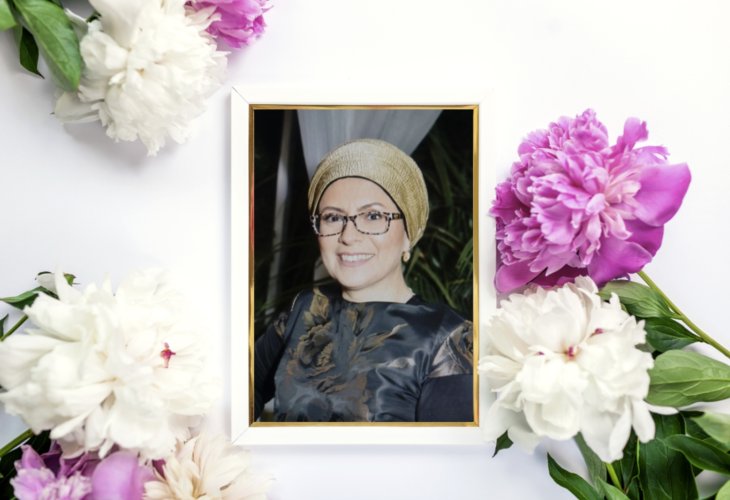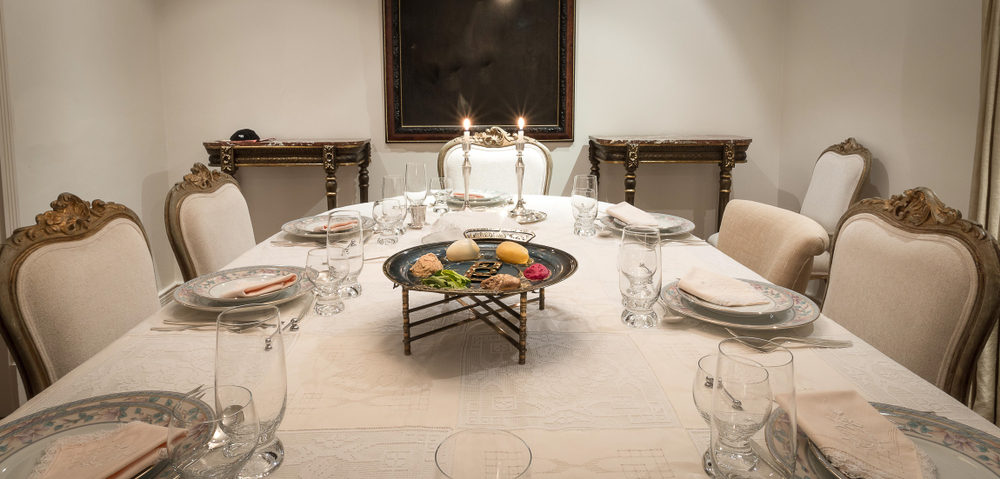Leah Yusupovitch: "You Won't Believe It, Last Year We Had the Seder with the Married Kids and Grandchildren"
What led Leah Yusupovitch to spend last year's lockdown with all her children and grandchildren? How does this relate to her return to faith and her childhood in a kibbutz?
 Leah Yusupovitch
Leah YusupovitchOn last year's Seder night, when the residents of Israel celebrated in a limited fashion with nuclear families, Leah Yusupovitch hosted a large Seder at her home in Moshav Hemed. In addition to her unmarried children, her married children and grandchildren also participated, all gathered together around a large and beautiful table. "I did it completely legally," she emphasizes, "as in the past year and a half, my married children have been living in housing units within my private home, which means they are entirely part of my nuclear family."
For those who don't understand, she quickly explains: "It wasn't always like this. Until about two years ago, we lived in Rishon LeZion, and our married children lived in other cities. At some point, we purchased an estate in Moshav Hemed and built our dream house there, along with two housing units intended for hosting or renting. However, things turned out completely different from our original plans – my husband passed away unexpectedly, and I was left alone in the big house. During the week of mourning, all my children were with me, but immediately afterward, they told me they weren't planning on returning home, but instead would come to live in our housing units along with their children. Since then, we've been living together like one big family. I get to be with my grandchildren every day, and knowing that the dearest people in my life are with me, encourages me so much. It gives me the strength to cope with my husband's absence, which is so strongly felt."
 (Photo: shutterstock)
(Photo: shutterstock)Kibbutz Child
The interesting thing about Leah and her family's story is that she was raised on a kibbutz. "I was born in a transit camp in Ramat Eliyahu," she says, "This was after my parents moved from Tunisia to France and then immigrated to Israel. When I was a year old, they decided to move to a kibbutz, choosing Be'erot Yitzhak because it was important for them to choose a religious kibbutz. We, the children, had to get used to kibbutz life."
The family's five children were introduced to a very different world from what they knew. "Living on a kibbutz is something that if you don't connect with, you'll never adjust to it," Leah explains. "Unlike my sister who still lives in Be'erot Yitzhak, I didn't like the kibbutz at all, and the main thing I remember from my childhood years is the big children's house that I so disliked sleeping in. My mother says that as a child, I would sleepwalk home every night, and she, being obedient and meticulous, would dress and take me back to the children's house so that no one would gossip about us. This instilled in me a sort of aversion to the children's house. Even then I knew that as soon as I could - I would leave the kibbutz."
At 18, she indeed left the kibbutz, and along with that, she also left religion. "Maybe there's a connection between the two," she reflects. "I wanted to run away and distance myself as much as possible. For a few years, I lived in the city, worked, and studied a bit."
How did your parents react to the change in you?
"I know it was very hard for them that I left religion, but they always tried to give me full attention and understanding. They almost never talked to me about how it bothered them, but I always felt their pain. I was also in pain, but from the other side, I felt the kibbutz took away my family life. It wasn't that I wanted to distance myself from Judaism, I just wanted to be with myself.
"It’s not pleasant to say, but in those days I cared less about how my parents felt. Although I didn't cut ties with them, and when I visited the kibbutz, I always did so modestly and respectfully, even attending synagogue prayers. But the main thing that mattered to me in those days was freedom. I wanted to feel free to follow my own path and opinions. In the kibbutz, there was a lack of this freedom, because despite the open spaces, everything was very closed and confined – you have parents and chores, a guide and an educator, all around you trying to educate you. I hated it and just wanted to escape."
For the Sake of Family
Then came several years when Leah served in the army and later met her husband, who came from a traditional family background. "He had siblings who returned to faith, but he wasn’t interested in Judaism at that time. Only a few years later, when I was about to have my first daughter, one of my sisters-in-law recommended that we attend a 'kiruv' seminar. We went there without realizing it would change our lives."
From the seminar, they returned as different people. "It was on the eve of Shavuot, and I celebrated the holiday with a head covering," she shares, "My husband also became much stronger in his faith, and so we returned to complete observance. I didn't find it difficult at all, I felt I returned to a place I loved so much, that I missed without even knowing it."
Leah emphasizes that what she lacked so much on the kibbutz – the family atmosphere, is what she invests in more than anything else in her life today. "The fact that my children live with me, in the same house, is an enormous prize for me and for them. I’m available all day to help them with the grandchildren, and I genuinely do it with joy. For me, it's a huge privilege, and I especially felt this during the corona period. During those days, all grandmothers had to feel their grandchildren through screens, while I was with them all the time.
"When I recall what happened last Passover Eve, I can say we almost didn’t feel that our routine changed. On the contrary, because of the lockdown and not going to work, we all engaged in cleaning with joy and such pleasure. Occasionally we went out shopping, as much as we could. We even held prayers inside the house. We had a Torah scroll and almost a minyan of worshippers. Since the place is large, we could let a few neighbors join us to pray together, to complete the minyan. We felt the struggle of the people of Israel in our hearts, but nothing was lacking at home."
Shortly before Passover, Leah's son-in-law approached her with a request for a bride orphaned at 30 who had planned to marry in Keter HaRimon but had nowhere to hold the wedding due to the hall closures. "He suggested she get married at our home, and I immediately agreed. I was so pleased that our big house could serve such purposes. Of course, from that moment on, we prepared the house to serve as a wedding hall, and we had an amazing and beautiful wedding. The bride enjoyed it, and I enjoyed it no less. I felt how incredible it is that on one hand, Hashem sends us such difficult trials, and on the other hand, grants us such drops of kindness."
There will be those who hear about you living with your children and see it as an invasion of privacy...
"This is something I considered from the first moment and was aware of," clarifies Leah. "I realized that although I could be with my grandchildren as much as I wanted, it doesn't make me their mom. I developed an enormous sensitivity, and I'm the last one to impose on my daughters-in-law, demanding things of them. Personally, I don't see any drawback in these shared living arrangements, only a huge prize that Hashem has given me and my children."
Additionally, Leah emphasizes that she is very careful to set boundaries. "We don’t have lunch together, and we don’t always eat together on Shabbat. On the contrary, usually, each family eats in their home, and I stay at home with the unmarried children, giving them the attention I can’t always provide during the week. Sometimes we meet after the meal for a cup of tea and cake, and sometimes not even that."
To Rejoice and Dance
But there is something good that Leah took from kibbutz life – the field of dance. "I always loved to dance," she says, "and as a child, I practiced folk dancing and aerobics extensively. After returning to faith, I totally left dance, as life led me elsewhere and I felt that, as an observant woman, it wasn’t appropriate to be involved in dance; it seemed too open-minded then, so I closed the doors on it."
A few months before her husband passed away, Leah wanted to enroll in a dance course at Karen Bonin's dance school. "I happened to hear about this school," she shares, "At the time, I was running an orthopedic clinic called 'Orthodoc' which I manage to this day. One day a client came in with dance shoes and asked me to consult with my husband about whether these shoes were recommended for health reasons. My husband replied that under no circumstances should such shoes be worn, but we started a conversation, and she told me about studying dance at Karen Bonin's course at Baila school that teaches Jewish dance. The more she spoke, the more I felt a desire to dance and rejoice. The idea excited me so much. At that time, I tried to find out about the classes at the school and also asked my husband, but he responded that it seemed unwise to start studies requiring so much at a time when we were in the process of moving, and I agreed with him.
"A few months later, he died, and I was in great pain then. I felt I needed to do something to elevate my morale and joy of life. I felt this would help me overcome the trial and rehabilitate, so the decision fell, and I enrolled in the school."
Was it hard for you to feel happy and dance when you were supposed to be in mourning?
"To tell the truth, it was very challenging, not only because I sang and rejoiced when society expected me to be in pain, but also because I so wanted to share the things I was learning with my husband. For years he had been a partner in my dance dreams, and I missed being able to share them with the closest person to me."
At some point, Leah considered leaving the dance school, but her children wouldn't allow it, and she continued to progress, doing her internship with her grandchildren at home. Nowadays, she is nearing the end of her studies, intending to open groups and teach dance to other women in neighboring towns like Or Yehuda, Rishon LeZion, and Kfar Chabad. "I think dance is one of the most wonderful things a woman can have," she concludes, "It's important both for the body and soul. I can prove it from close experience."

